- Home
- Pat Barker
The Eye in the Door Page 6
The Eye in the Door Read online
Page 6
He had no memory of Beattie’s face. She’d been an object then, a mountain, the side of a house, vast, taken for granted, not a person to whom you could attach adjectives. Though he could attach them readily enough now: lively, opinionated, intelligent, uneducated, foul-mouthed, impulsive, generous, quick-tempered, kind. Prior’s mother, his gentle and, it had to be said, genteel mother, hated Beattie Roper, though, when his mother became ill with suspected tuberculosis, it was to Beattie he’d been sent. That must have been his father’s decision.
For almost a year, when he was five or six years old, he’d lived with Beattie and played with her two daughters, Winnie, who was now in Leeds Prison, and Hettie, who’d been charged with conspiracy to murder, but acquitted. He’d been the baby, when they played houses; the customer, when they played shops; the pupil, when they played schools; the patient, when they played nurses; and all these roles had been extremely boring, except, now and then, the role of patient.
They’d played under the big table in the kitchen, because its green tasselled cloth hanging down all round them made a separate world. Particularly on wash days, when the house was invaded by smells of soda, Dolly Blue and wet wool, and the wind blew grit in from the yard, the table was their refuge. Between the green tassels they looked out at adult boots coming and going, and felt a pleasant sense of power.
Mr Carker’s boots. Mr Carker was secretary of the Independent Labour Party, and sometimes he and Beattie sat together at the table, discussing politics. These discussions had been, in every sense, above Prior’s head, though he remembered one remark of Mr Carker’s to the effect that the suffragettes simply exploited working-class women like Beattie. ‘It’s all very well, talking about sisterhood, but when they go home at night and drop their knickers, it’s somebody else’s job to pick them up.’
Probably it was the reference to dropping knickers that had made that particular remark stick in his mind. Perhaps it excited Mr Carker too, for shortly afterwards his boot crept along the floor and brushed against Beattie’s foot. She moved her foot. The boot followed, accompanied this time by a hand on her knee, a hand that just lifted the green tassels. Prior looked round and saw Hettie’s stricken face. It was a house with no father, and all the children, but particularly Hettie, were passionate in defence of their mother. For the first time in his life, perhaps, Prior was aware of another’s pain. Stealthily, he reached out and tied Mr Carker’s boot laces together, so that when, finally, he got up to go, he tripped and measured his full length on the floor.
The disciplining of children must have been the only subject on which Beattie held no advanced views. She’d hauled him out of his hiding place, tipped him over her knee and tanned his arse; and he’d clenched his teeth, divided between a blaze of joy that he was suffering for Hettie’s sake, and regret that the suffering should not have taken a more dignified form.
Major Lode, interviewing him for his present post, had leant across the table and said, ‘You see, you know these people, don’t you?’
Prior took a last drag of his cigarette, leant over the edge of the bed and stubbed it out in the ashtray. Yes.
He drew the curtains and got inside the sheets. He was afraid to go to sleep, but he had learnt, from long experience, that to keep himself awake at night only to fall asleep shortly before dawn made for the worst nightmares of all. He lay and stared at the ceiling, unblinking, until his eyelids prickled, then rolled over on to his side and brought his knees up to his chin.
He was back in the winter landscape, with a sound like wind blowing, only it was not the wind, but the sound of emptiness. A hawk flew over and he watched its shadow on the snow. They were marching back. His boot went through thin ice into freezing mud. The ice meshed out round his foot, white opaque lines radiating out so that he stood at the centre of a frozen web.
The cold half woke him. He found his leg outside the covers and brought it back inside, but now his whole body was cold. He was lying naked on a stone floor. Because his sleep was light, he knew he was dreaming, and he knew also that he had to wake up before something worse happened. He turned and saw the eye watching him, an eye not painted but very much alive. The white glittered in the moonlight. The same noise of emptiness he’d heard in France had followed him into the cell. He stared at the eye, and then, by a supreme effort of will, forced himself to sit up.
Sweating and clammy, he reached down for his cigarettes, and remembered he’d left them on the desk. He got up and felt his way along, not wanting to switch on the light because the horror of the nightmare was heavy on him, and he was afraid of what the glare might reveal. He was standing by the desk, in the half-darkness, dabbing his hands among his papers, searching for the cigarette packet, when he heard a chuckle and spun round. The eye was watching him from the door. He shrank back against the table, his hands groping behind him for the paper-knife. His fingers closed round the hilt and he sprang at the door, stabbing the eye again and again, his naked body spattered with blood and some thick whitish fluid that did not drip but clung to his belly, and quickly chilled. Then, exhausted, he slipped to the floor and lay there, sobbing, and the sound of his sobbing woke him up.
At first he simply stared at the door. Only when he was sure there was no eye did he start to relax and take in the strangeness of his position. The fingertips of his right hand patted the cold oilcloth, as if by touching it he could make it turn into a mattress and sheets. No, he was out of bed, lying on the floor. Nightmare, he thought, drawing a deep breath. He started to pull himself up, feeling a wetness in his groin, and, as he did so, his splayed fingers touched the knife. So that had been real. With a spasm of revulsion, he struck out at it and sent it skittering across the floor.
FIVE
The aerodrome consisted of two runways and a straggle of low buildings set in one corner of a field.
Rivers and Dundas got out of the car and stood looking at the sky: clear, except for one bank of dark cloud away on the horizon.
‘Good weather for it, anyway,’ Dundas said.
It was possible to tell he was frightened, but only because Rivers had been observing him closely for weeks. Dundas suffered from abnormal reactions in the air. Where healthy pilots experienced no sensation at all, Dundas reported feeling his head squashed into his body, or a loss of movement in his legs. He suffered from nausea. More seriously still, he had more than once experienced the preliminary stages of a faint. After every physiological test possible had proved negative, he had been handed over to Rivers for psychological observation. Unfortunately, Rivers was making no progress. Dundas seemed to be exactly the sort of cheerful, likable, slightly irresponsible young man he’d grown accustomed to dealing with in the Royal Flying Corps. Apart from flying, his main interests were amateur dramatics, music and girls, not necessarily in that order. He appeared, in fact, to be entirely normal. Until he got into an aeroplane. And they were here to do just that.
‘We seem to have arrived a bit early,’ Dundas said. ‘Would you like a cup of tea?’
The canteen was empty, except for a group of young fliers gathered round a table in the far corner, most of them in their twenties, one ginger-haired lad noticeably younger. Dundas went off to get the tea, and Rivers sat down at a table whose entire surface was covered with interlocking rings of tea stains. The young men were reading newspapers, chatting in a desultory fashion about the events of the day: the massive German advance, Maud Allan’s libel action against Pemberton Billing, the cult of the clitoris. A dark-haired young man held up a photograph of Maud Allan. ‘If she ever fancies anything bigger she’s welcome to knock on my door.’
‘She’d not notice the difference,’ somebody said.
A good-natured scuffle. Then a new voice: ‘Did you hear the one about Lord Albemarle? Went into the Turf, and said…” A desiccated, aristocratic bleat. ‘“Keep reading in the papers about this Greek chap, Clitoris. Anybody know who he is?”’ They all laughed, the younger lad with braying anguish; it was immediately clear his conf
usion at least equalled Lord Albemarle’s.
Dundas came back with the tea and two very greasy doughnuts.
‘Not for me, thank you,’ Rivers said, patting his stomach. ‘I have to be careful.’
Dundas nodded uncomprehendingly. Obviously duodenal ulcers and having to be careful were a million miles away from his experience. He ate both doughnuts with every sign of relish. Rivers sipped his tea and tried not to think that if Dundas’s medical records were anything to go by (my God, they’d better be!) he could expect to see the doughnuts again before long.
They didn’t talk much. Dundas was too tense, and Rivers respected his need for silence. When they’d finished, they walked across to the hangars together. Dundas disappeared inside the first hangar for a moment and came back carrying flying helmets, jackets and gauntlets. Rivers put a jacket on and followed Dundas across to the aeroplane.
‘Here she is,’ Dundas said, patting the fuselage. ‘Terrible old bucket. Can’t think why they’ve given us this one.’
Because it’s the one they can best afford to lose, Rivers thought. He’d intended this reflection as a small private joke, but instead it brought him face to face with his own fear.
‘Right,’ Dundas said. ‘If you’d like to hop in.’
Rivers climbed into the observer’s seat and fastened the harness. Dundas bent over him to check the buckles. A faint smile acknowledged the reversal of the usual caring role. ‘All right?’ he said.
‘Fine.’
‘You’ve done a lot of flying, haven’t you?’
‘I don’t know about a lot. Some.’
‘But you’ve done spins and loops and things?’
‘Yes.’
Dundas smiled. ‘That’s all right, then.’
Something about Dundas’s smile held Rivers’s attention. Suddenly, he felt certain Dundas was withholding something, even perhaps concealing it. Not malingering. In fact, rather the reverse. He thought Dundas might be minimizing his symptoms. It wasn’t a good moment for that particular perception to strike.
Dundas pulled his helmet on, climbed in, exchanged a whole series of shouts and waves with the mechanics. The engine stuttered, began to roar, and then they were taxiing away from the hangar.
Rivers looked round him, at hedgerows thick with blossom, a sky tumultuous with rising larks; then he snapped his goggles into place, and the splendour contracted to a muddy pond.
He was now definitely afraid. The situation might almost be regarded as a small experiment, with himself as the subject. The healthy reaction to fear in a normal human being is the undertaking of some manipulative activity designed to avoid or neutralize the danger. Provided such activity is available, the individual ought to be unaware of feeling fear. But no such activity was available. Like every other man who sits in the observer’s seat, he was entirely dependent on his pilot. And what a pilot. He had long believed that the essential factor in the production of war neurosis among the two most vulnerable groups, observers and trench soldiers, was the peculiarly passive, dependent and immobile nature of their experience. It isn’t often that a hypothesis conceived in the scientist’s cortex is confirmed by his gut, but his gut certainly seemed to be doing its best to prove this one. He bit his lips to control the pain and concentrated hard on the back of Dundas’s head, at the wisps of reddish-gold hair escaping from beneath the helmet, the pink neck, the edge of white scarf, the brown leather of his flying jacket, scuffed and scarred with wear.
‘ALL RIGHT?’ Dundas yelled.
They had reached their take-off position. The engine raced. Rivers felt himself pushed hard back against the vibrating seat. The plane lifted, bumped, lifted again, and then climbed steeply away from the huddle of buildings.
He looked over the side, shielding his mouth from the wind. The countryside stretched below them, grey striations of lanes and roads, the glitter of a pond, great golden swathes of laburnum, a line of hedgerow white with blossom, blue smoke from a bonfire drifting across a field of green wheat.
A movement from Dundas brought him back to the task in hand. Dundas was making a spinning movement with his hand. The comforting roar of the engine faltered, then became an infuriated mosquito whine as the plane started to spin. Dundas’s eyes were fixed on his instruments. Rivers watched the sun revolve in a great spiral round the falling plane. Abruptly, the sun vanished, and the green fields rushed up to meet them. Dundas pulled on the stick, but something was wrong. The horizon was tilted. Rivers leant forward and tilted his hand to the left. Slowly the horizon straightened.
Dundas had lost his sense of the horizontal. Already.
‘HOW WAS IT?’ Rivers yelled.
Dundas waved his hand in an incomprehensible gesture, then put one hand on top of his head and pressed repeatedly, indicating he’d felt his head being squashed into his body. He made the spinning movement again. Rivers shook his head and made a looping movement. After a moment’s hesitation, Dundas’s thumb went up.
The plane banked steeply as Dundas turned and made for the city. He was not meant to do this, and Rivers guessed he was trying to make the flight last as long as possible. In a short time he saw beneath him the sulphurous haze of London. This was the view seen by the German pilots as they came in on moonlit bombing raids, following the silver thread of the Thames, counting bridges, watching for the bulge of the Isle of Dogs.
Rivers tapped Dundas on the shoulder. Dundas turned round and nodded. So much of his face was hidden by the goggles it was impossible to read his expression. Rivers sat back and again concentrated on his own sensations. After the fifth loop he began to feel he was loose in his seat, a reaction he remembered from other flights and knew to be a frequent, though not universal, reaction of healthy fliers. They again came out with one wing down. Dundas leant over the side and retched, but didn’t vomit. Rivers jerked his thumb at the ground, but Dundas ignored him.
With no idea at all now which manoeuvre to expect, Rivers sat back and tried to relax as the plane climbed. The vast blue haze of London fell away beneath the left wing-tip. Higher and colder. Wisps of cloud hid the sun; columns of shadows flitted rapidly across the city. Rivers felt calm, suddenly. There were worse ways to die, and he’d seen most of them.
Again the engine faltered, giving way to the mosquito whine as the plane began to fall. Dundas came out of the spin, white, giddy, confused and clearly finding it difficult to focus on his instruments. Rivers could see him peering at them. He yelled, ‘DOWN!’ and jerked his finger at the ground. Dundas leant out of the plane and was sick.
They had a bumpy landing, though not worse than many others Rivers had experienced. After the plane had taxied to a halt, Dundas stayed in his seat for a few moments before jumping down. He staggered slightly and held on to the wing. Rivers climbed down and immediately went up to him.
‘I’m all right,’ Dundas said, letting go of the wing.
Two mechanics were walking towards the plane. Dundas turned to them and made some comment on the flight. The three went into a huddle, and Rivers walked to one side. Dundas was smiling and talking cheerfully, but then Dundas was a very good actor.
When he came across to join Rivers, he said, ‘Sorry about that.’
‘Shall we go and sit down?’
Dundas looked towards the canteen, but shook his head. ‘I think I’d just as soon get back, if you don’t mind.’
Rivers’s legs were trembling as they walked back to the car. He was angry with himself for getting into such a state – angry, ashamed and inclined to pretend he’d been less frightened than he knew he had been. He observed this reaction, thinking he was in the state of fatigue and illness that favours the development of an anxiety neurosis, and behaving in the way most likely to bring it about. He was doing exactly what he told his patients not to do: repressing the awareness of fear.
In the car going back to the hospital, Dundas examined his reactions minutely. During the first spin, in addition to the squashed head feeling, he’d felt sick. ‘Not so much sick.
More a sort of bulge in my throat. And then during the loop I felt really sick. And faint. The sky went dark.’
‘And in the last spin?’
‘That was terrible. I felt really confused.’
After leaving Dundas in the hospital entrance hall, Rivers went into his room and threw his cap and cane on to the chair. Henry Head came in a moment later. ‘How was he?’
‘Bad.’
‘Sick?’
‘And faint.’
‘Are you all right?’
‘No, I seem to be suffering from terminal stiff upper lip. You know the way I go on about not repressing fear? What did I do?’ He spread his hands.
‘It’s the Public School Factor, Will. We’re all too well trained.’
‘It’s the Silly Old Fool Factor. Too many young men around.’
Head smiled. ‘No, well, I know what you mean. One doesn’t want to seem totally decrepit.’
‘I had this sudden sense that Dundas was hiding something. And that didn’t —’
‘He is.’
Rivers looked surprised.
‘He’s got a bottle of Bumstead’s Gleet Cure in his locker.’
‘Has he?’
‘Sister Mitchell noticed it. Syphilis wouldn’t make him go faint, mind.’
‘Lying awake worrying about it might.’ Rivers sat in silence for a moment. ‘Well. Redirects the investigation a bit, doesn’t it?’
‘Makes it a helluva lot simpler.’ Head dropped into a sergeant-major’s baritone. ‘“Show us yer knob, lad.” Are you coming to dinner?’
‘Yes, and then I must dash. I’m supposed to be seeing somebody at eight.’
Rivers had the top floor of a large house near Hampstead Heath. The house was within a hundred yards of the great gun, and there were times when its proximity showed in every line of his face.
Prior arrived exactly on time, and was about to ring the bell when he saw Rivers walking rapidly up the hill.
‘Have you rung?’ Rivers asked, getting out his key.

 Border Crossing
Border Crossing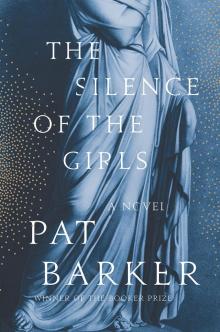 The Silence of the Girls
The Silence of the Girls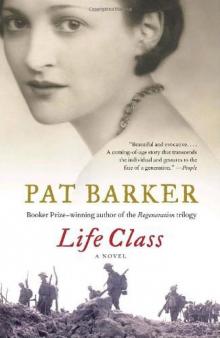 Life Class
Life Class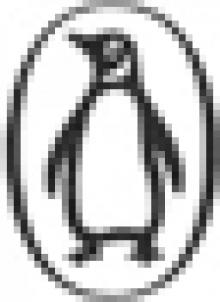 Regeneration
Regeneration Another World
Another World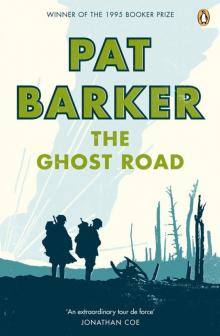 The Ghost Road
The Ghost Road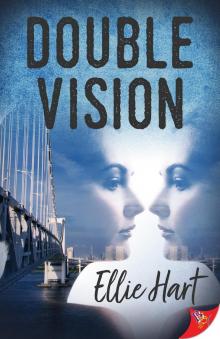 Double Vision
Double Vision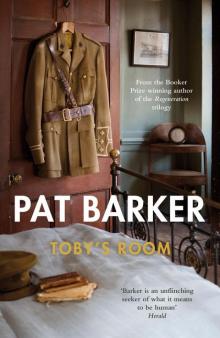 Toby's Room
Toby's Room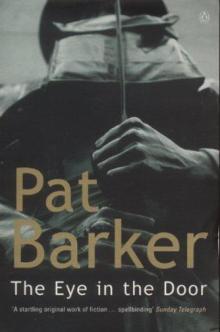 Regeneration Trilogy 02 - The Eye in the Door
Regeneration Trilogy 02 - The Eye in the Door The Eye in the Door
The Eye in the Door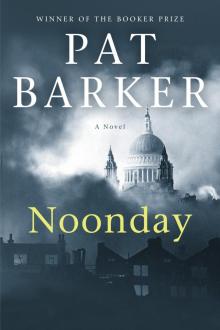 Noonday
Noonday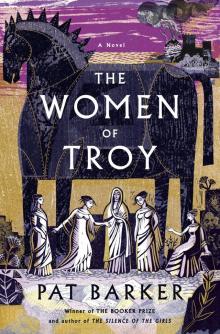 The Women of Troy: A Novel
The Women of Troy: A Novel